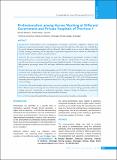Please use this identifier to cite or link to this item:
https://hdl.handle.net/20.500.14356/900Full metadata record
| DC Field | Value | Language |
|---|---|---|
| dc.contributor.author | Bhandari, Menuka | - |
| dc.contributor.author | Dahal, Tulasha | - |
| dc.contributor.author | KC, Jyoti | - |
| dc.date.accessioned | 2023-04-04T08:50:44Z | - |
| dc.date.available | 2023-04-04T08:50:44Z | - |
| dc.date.issued | 2022 | - |
| dc.identifier.citation | BhandariM., DahalT., & KCJ. (2022). Professionalism among Nurses Working at Different Government and Private Hospitals of Province 1. Journal of Nepal Health Research Council, 20(02), 419-425. https://doi.org/10.33314/jnhrc.v20i02.4071 | en_US |
| dc.identifier.issn | Print ISSN: 1727-5482; Online ISSN: 1999-6217 | - |
| dc.identifier.uri | http://103.69.126.140:8080/handle/20.500.14356/900 | - |
| dc.description | Orginal Article | en_US |
| dc.description.abstract | Abstract Background: Professionalism is the conceptualization of attributes, interactions, obligations, attitudes, and behaviours required of professionals in relation to clients and society. The objectives of the study were to identify the five specific attitudes of professionalism; belief in self-model, belief in public service, a sense of calling to the field of study, a feeling of autonomy, and the importance of professional organization and to examine the relationship of selected variables with the attributes of professionalism. Methods: The cross-sectional study design was used. The self-administered questionnaire consisted of Hall’s Professional Inventory as revised by Snizek was used for data collection, which includes 25 items. The sample size was 316 nurses from seven government and four private hospitals of province 1. Descriptive statistics were used to find frequencies, percentages, means, SDs, and ranges. Multivariate analysis was performed using a linear regression model. Results: The mean score of the total professionalism was 87.54 (SD=7.99) and the highest score was on attitude towards the sense of calling (Mean=18.86, SD=2.66). Nurses with master’s degree education had the high autonomy (ß=-0.193, p=0.004), Matron (ß=2.109, p=0.036) and the membership of Nursing Association of Nepal (ß=0.200, p=0.004), current salary of the senior nurse (ß=-0.172, p=0.037), and matron (ß=-2.501, p=0.013) had a positive relationship with self-regulation. The experienced nurses (ß=-0.296, p=0.010) had a more positive attitude towards a sense of calling. Conclusions: The professionalism status of nurses was not seen adequate in this study. The present study concluded that the Master’s degree in Nursing education, administrative position such as matron, incharge, good salary, sufficient working experience, membership in a professional organization, adequate training, job satisfaction, research and publication are the most important factors of professionalism for nurses. Keywords: Government hospitals; hall’s professional scale; nurses; private hospitals; professionalism | en_US |
| dc.language.iso | en | en_US |
| dc.publisher | Nepal Health Research Council | en_US |
| dc.subject | Government hospitals | en_US |
| dc.subject | Hall’s professional scale | en_US |
| dc.subject | Nurses | en_US |
| dc.subject | Private hospitals | en_US |
| dc.subject | Professionalism | en_US |
| dc.title | Professionalism among Nurses Working at Different Government and Private Hospitals of Province 1 | en_US |
| dc.type | Journal Article | en_US |
| Appears in Collections: | Vol 20 No 02 Issue 55 April-June, 2022 | |
Files in This Item:
| File | Description | Size | Format | |
|---|---|---|---|---|
| 4071-Manuscript-29690-1-10-20221103.pdf | Full Article. | 360.12 kB | Adobe PDF |  View/Open |
Items in DSpace are protected by copyright, with all rights reserved, unless otherwise indicated.
